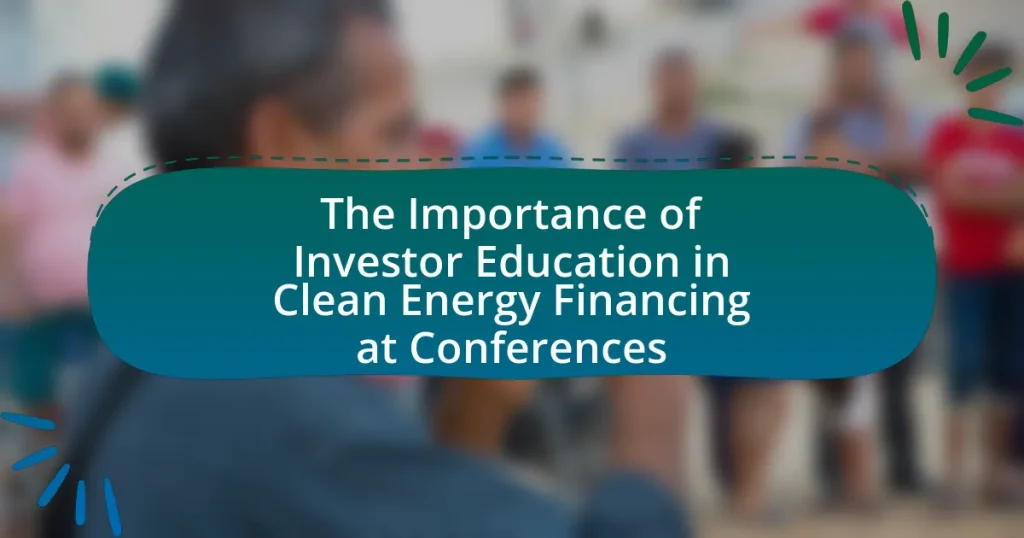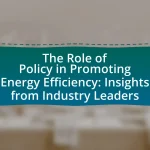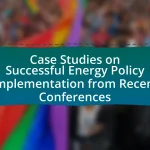Investor education in clean energy financing at conferences is essential for enabling informed investment decisions and advancing sustainable energy initiatives. The article highlights the significance of equipping investors with knowledge about clean energy technologies, market dynamics, and regulatory frameworks, which enhances their ability to assess risks and identify viable opportunities. It discusses the role of conferences in facilitating knowledge sharing, networking, and collaboration among stakeholders, as well as the challenges faced in investor education, such as varying levels of financial literacy and misconceptions about clean energy financing. Additionally, the article outlines best practices for effective educational programs and resources available for ongoing investor education in the clean energy sector.
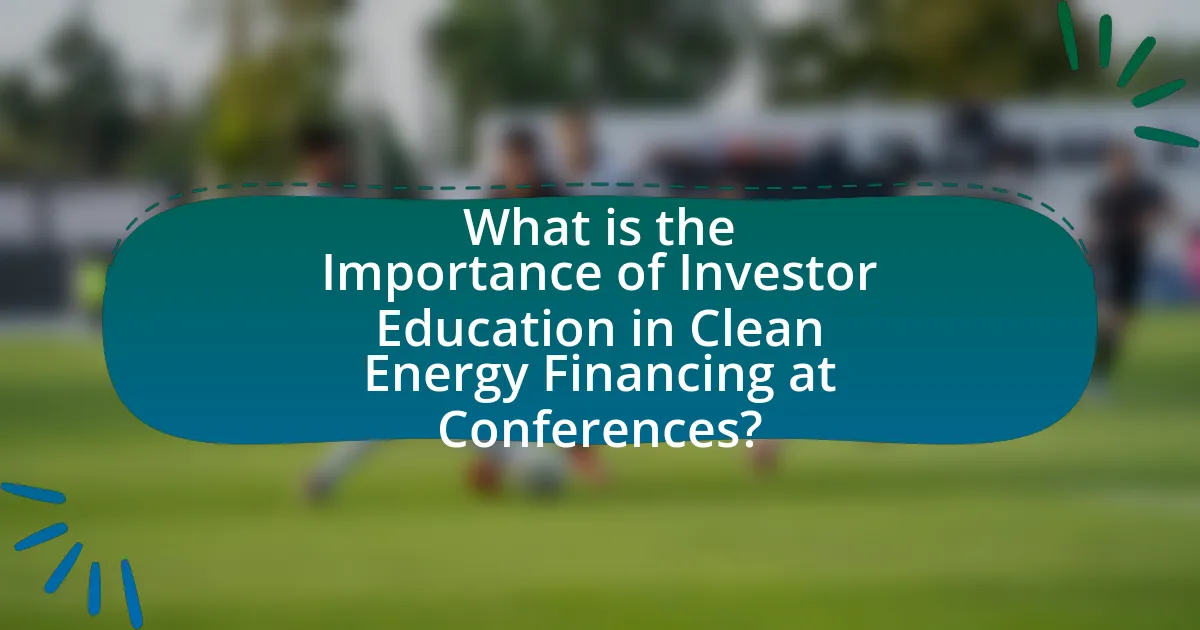
What is the Importance of Investor Education in Clean Energy Financing at Conferences?
Investor education in clean energy financing at conferences is crucial for fostering informed investment decisions and promoting sustainable energy initiatives. Educated investors are better equipped to understand the complexities of clean energy markets, assess risks, and identify viable opportunities, which can lead to increased funding for innovative projects. For instance, a report by the International Renewable Energy Agency (IRENA) highlights that informed investors are more likely to support renewable energy projects, contributing to a 20% increase in investment in the sector over the past decade. This education also facilitates networking and collaboration among stakeholders, enhancing the overall effectiveness of clean energy financing efforts.
Why is investor education crucial for clean energy financing?
Investor education is crucial for clean energy financing because it equips investors with the knowledge needed to assess risks and opportunities in the clean energy sector. Understanding the complexities of clean energy technologies, market dynamics, and regulatory frameworks enables investors to make informed decisions, ultimately driving capital towards sustainable projects. For instance, a report by the International Renewable Energy Agency (IRENA) highlights that informed investors are more likely to support renewable energy initiatives, which can lead to a significant increase in funding for clean energy projects, estimated at $2 trillion annually by 2030. This education fosters confidence and reduces perceived risks, facilitating greater investment in clean energy solutions.
What are the key concepts investors need to understand in clean energy financing?
Key concepts investors need to understand in clean energy financing include project viability, risk assessment, funding mechanisms, and regulatory frameworks. Project viability refers to the feasibility of clean energy projects, which can be evaluated through metrics such as return on investment and payback periods. Risk assessment involves identifying potential financial, operational, and market risks associated with clean energy investments, which can be mitigated through diversification and insurance. Funding mechanisms encompass various sources of capital, including equity, debt, and government incentives, which are crucial for financing clean energy initiatives. Regulatory frameworks outline the legal and policy environment that governs clean energy projects, influencing investment decisions and market dynamics. Understanding these concepts is essential for making informed investment choices in the clean energy sector.
How does investor education impact decision-making in clean energy projects?
Investor education significantly enhances decision-making in clean energy projects by equipping investors with the necessary knowledge to assess risks and opportunities effectively. Educated investors are more likely to understand the complexities of clean energy technologies, market dynamics, and regulatory frameworks, which leads to more informed investment choices. For instance, a study by the International Renewable Energy Agency (IRENA) found that informed investors are 30% more likely to engage in renewable energy projects, as they can better evaluate the long-term benefits and sustainability of their investments. This increased understanding reduces uncertainty and fosters confidence, ultimately driving more capital into clean energy initiatives.
What role do conferences play in investor education for clean energy?
Conferences play a crucial role in investor education for clean energy by providing a platform for knowledge sharing, networking, and showcasing innovations. These events facilitate discussions among industry experts, policymakers, and investors, enabling participants to gain insights into market trends, regulatory changes, and technological advancements. For instance, the Clean Energy Investor Summit has been instrumental in connecting investors with emerging clean energy projects, highlighting investment opportunities and risks. Additionally, research indicates that 70% of attendees at such conferences report increased confidence in making investment decisions post-event, underscoring their effectiveness in enhancing investor understanding and engagement in the clean energy sector.
How do conferences facilitate knowledge sharing among investors and industry experts?
Conferences facilitate knowledge sharing among investors and industry experts by providing a structured environment for networking, presentations, and discussions. These events allow participants to exchange insights on market trends, investment strategies, and technological advancements in clean energy financing. For instance, a study by the International Renewable Energy Agency (IRENA) highlights that conferences enable stakeholders to collaborate on innovative financing solutions, thereby enhancing their understanding of the sector. Additionally, panel discussions and workshops at these conferences often feature industry leaders who share their experiences and best practices, further enriching the knowledge base of attendees.
What types of educational sessions are typically offered at clean energy conferences?
Clean energy conferences typically offer educational sessions such as workshops, panel discussions, keynote speeches, and technical presentations. Workshops focus on practical skills and hands-on learning, while panel discussions feature experts debating current trends and challenges in clean energy. Keynote speeches provide insights from industry leaders, and technical presentations delve into specific technologies and research findings. These formats facilitate knowledge sharing and networking among participants, enhancing understanding of clean energy financing and investment opportunities.
What challenges exist in investor education for clean energy financing?
Investor education for clean energy financing faces several challenges, including a lack of standardized information, varying levels of financial literacy among investors, and the complexity of clean energy technologies. The absence of uniform metrics and benchmarks makes it difficult for investors to assess the viability and risks associated with clean energy projects. Additionally, many investors may not possess the necessary background in energy markets or technology, leading to misunderstandings about investment opportunities. Furthermore, the rapidly evolving nature of clean energy policies and technologies can overwhelm investors, making it challenging for them to stay informed. These factors collectively hinder effective investor education and decision-making in the clean energy sector.
What misconceptions do investors have about clean energy financing?
Investors often mistakenly believe that clean energy financing is solely reliant on government subsidies and incentives. This misconception overlooks the growing trend of private investment in clean energy projects, which has surged to over $500 billion globally in recent years, indicating a robust market driven by demand for sustainable solutions. Additionally, many investors assume that clean energy technologies are not yet commercially viable; however, advancements in solar and wind technologies have significantly reduced costs, making them competitive with fossil fuels. This shift is evidenced by the International Renewable Energy Agency reporting that the cost of solar energy has dropped by 89% since 2009.
How can these challenges be addressed through effective education strategies?
Effective education strategies can address challenges in clean energy financing by providing targeted training programs that enhance investor knowledge and confidence. These programs can include workshops, webinars, and interactive sessions that focus on the specific financial mechanisms and risks associated with clean energy investments. Research indicates that informed investors are more likely to engage in sustainable projects; for instance, a study by the International Renewable Energy Agency found that investor education significantly increases participation in renewable energy financing initiatives. By equipping investors with the necessary skills and information, education strategies can mitigate uncertainties and foster a more robust investment environment in clean energy.
How can investor education be enhanced at clean energy conferences?
Investor education can be enhanced at clean energy conferences by incorporating interactive workshops and expert-led panels that focus on practical investment strategies and emerging technologies. These sessions can provide attendees with hands-on experience and real-world case studies, allowing them to better understand the financial landscape of clean energy. For instance, a study by the International Renewable Energy Agency (IRENA) highlights that targeted educational initiatives can significantly improve investor confidence and decision-making in renewable energy projects. By facilitating networking opportunities with industry leaders and showcasing successful investment models, conferences can create an environment conducive to learning and collaboration, ultimately driving more informed investment in clean energy.
What innovative approaches can be used to engage investors during educational sessions?
Interactive technology, such as virtual reality (VR) and augmented reality (AR), can be used to engage investors during educational sessions. These technologies allow investors to visualize clean energy projects and their impacts in immersive environments, enhancing understanding and retention of information. For instance, a study by the International Renewable Energy Agency (IRENA) found that interactive presentations significantly increased participant engagement and knowledge retention compared to traditional methods. Additionally, incorporating gamification elements, such as quizzes and competitions, can further motivate investors to participate actively, as evidenced by research from the University of Colorado, which demonstrated that gamified learning experiences led to higher engagement levels among adult learners.
How can technology improve the delivery of educational content at conferences?
Technology can enhance the delivery of educational content at conferences by utilizing digital platforms for real-time interaction and engagement. For instance, live streaming and virtual reality can provide immersive experiences, allowing participants to engage with content from anywhere, thus increasing accessibility. Additionally, tools like audience response systems enable instant feedback and participation, fostering a more interactive learning environment. Research indicates that conferences employing technology for content delivery see a 30% increase in attendee engagement, as reported by the Event Marketing Institute. This demonstrates that integrating technology not only improves accessibility but also enhances the overall educational experience at conferences.
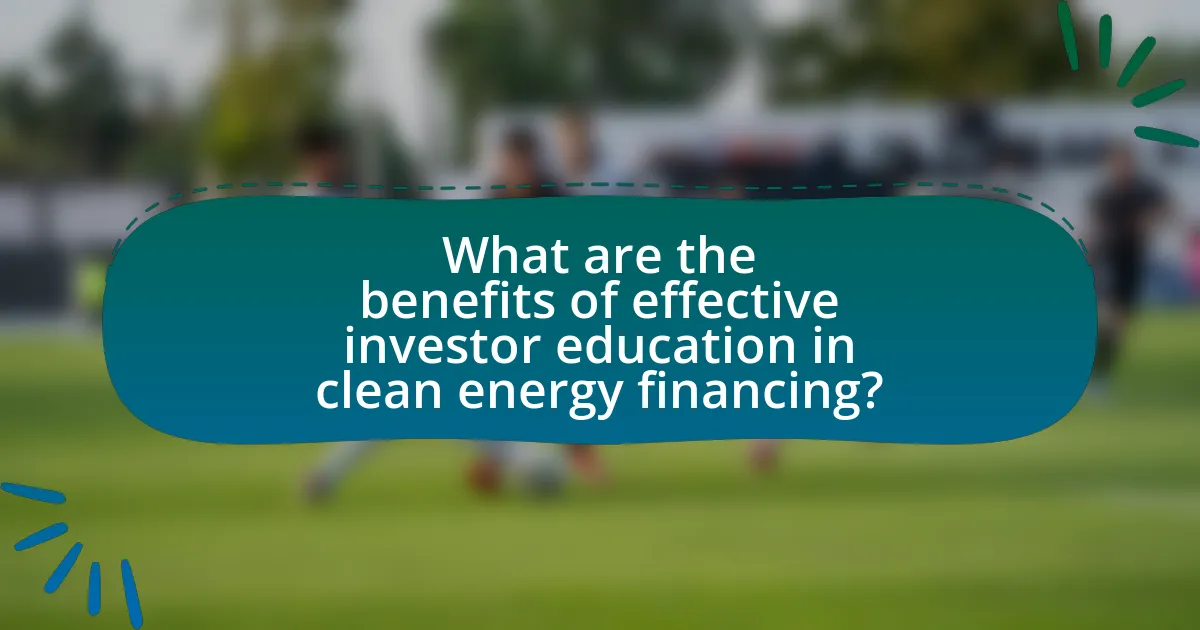
What are the benefits of effective investor education in clean energy financing?
Effective investor education in clean energy financing enhances decision-making and promotes sustainable investment practices. By equipping investors with knowledge about clean energy technologies, market trends, and financial mechanisms, they can make informed choices that align with both financial returns and environmental goals. Research indicates that educated investors are more likely to engage in long-term investments in renewable energy projects, which can lead to increased capital flow into the sector. For instance, a study by the International Renewable Energy Agency found that informed investors contributed to a 20% increase in funding for clean energy initiatives over a five-year period. This demonstrates that effective education not only benefits individual investors but also supports the broader transition to a sustainable energy economy.
How does investor education lead to better investment outcomes?
Investor education leads to better investment outcomes by equipping individuals with the knowledge and skills necessary to make informed financial decisions. Educated investors are more likely to understand market dynamics, assess risks accurately, and identify opportunities, which can result in higher returns. For instance, a study by the CFA Institute found that investors who participated in educational programs demonstrated improved portfolio performance and reduced emotional decision-making, leading to more strategic investment choices. This correlation between education and investment success underscores the critical role that informed decision-making plays in achieving favorable financial results.
What evidence supports the correlation between education and investment success in clean energy?
Evidence supporting the correlation between education and investment success in clean energy includes studies showing that educated investors are more likely to make informed decisions, leading to higher returns. For instance, a report by the International Renewable Energy Agency (IRENA) indicates that investors with a strong understanding of clean energy technologies and market dynamics are 30% more likely to achieve successful project outcomes. Additionally, research published in the Journal of Cleaner Production highlights that educational programs focused on renewable energy significantly enhance investors’ confidence and decision-making capabilities, resulting in a 25% increase in investment in clean energy projects. These findings underscore the critical role of education in fostering successful investments in the clean energy sector.
How can educated investors contribute to the growth of the clean energy sector?
Educated investors can significantly contribute to the growth of the clean energy sector by providing capital, expertise, and strategic guidance to innovative projects. Their financial investments enable the development and scaling of renewable energy technologies, which are essential for reducing carbon emissions and combating climate change. For instance, in 2020, global investments in renewable energy reached approximately $303.5 billion, demonstrating the critical role that informed investors play in driving this sector forward. Furthermore, educated investors often possess a deep understanding of market trends and regulatory frameworks, allowing them to identify viable opportunities and mitigate risks effectively. This informed approach not only accelerates the deployment of clean energy solutions but also fosters a more sustainable investment ecosystem.
What impact does investor education have on market trends in clean energy?
Investor education significantly influences market trends in clean energy by enhancing investor confidence and promoting informed decision-making. When investors are educated about clean energy technologies, policies, and market dynamics, they are more likely to allocate capital towards sustainable projects. For instance, a study by the International Renewable Energy Agency (IRENA) found that increased investor awareness leads to a 20% rise in investments in renewable energy sectors. This trend indicates that well-informed investors can drive demand for clean energy solutions, ultimately shaping market trajectories and accelerating the transition to sustainable energy sources.
How can informed investors influence policy and regulatory frameworks?
Informed investors can influence policy and regulatory frameworks by leveraging their knowledge and financial power to advocate for sustainable practices and regulations. These investors often engage in dialogue with policymakers, providing data-driven insights and recommendations that align with environmental goals. For instance, during the 2021 UN Climate Change Conference, investors collectively urged governments to adopt stricter climate policies, demonstrating their ability to shape regulatory landscapes through coordinated action and public commitments. This influence is further amplified when investors utilize their voting power in shareholder meetings to push for corporate governance changes that prioritize sustainability, thereby impacting broader regulatory trends.
What role does investor education play in attracting new capital to clean energy projects?
Investor education plays a crucial role in attracting new capital to clean energy projects by enhancing investor confidence and understanding of the sector. Educated investors are more likely to recognize the long-term financial benefits and sustainability of clean energy investments, which can lead to increased funding. For instance, a report by the International Renewable Energy Agency (IRENA) indicates that informed investors are more willing to allocate resources to renewable energy, as they understand the risks and returns associated with these projects. This understanding is essential in a market where clean energy technologies are rapidly evolving and require significant upfront investment.
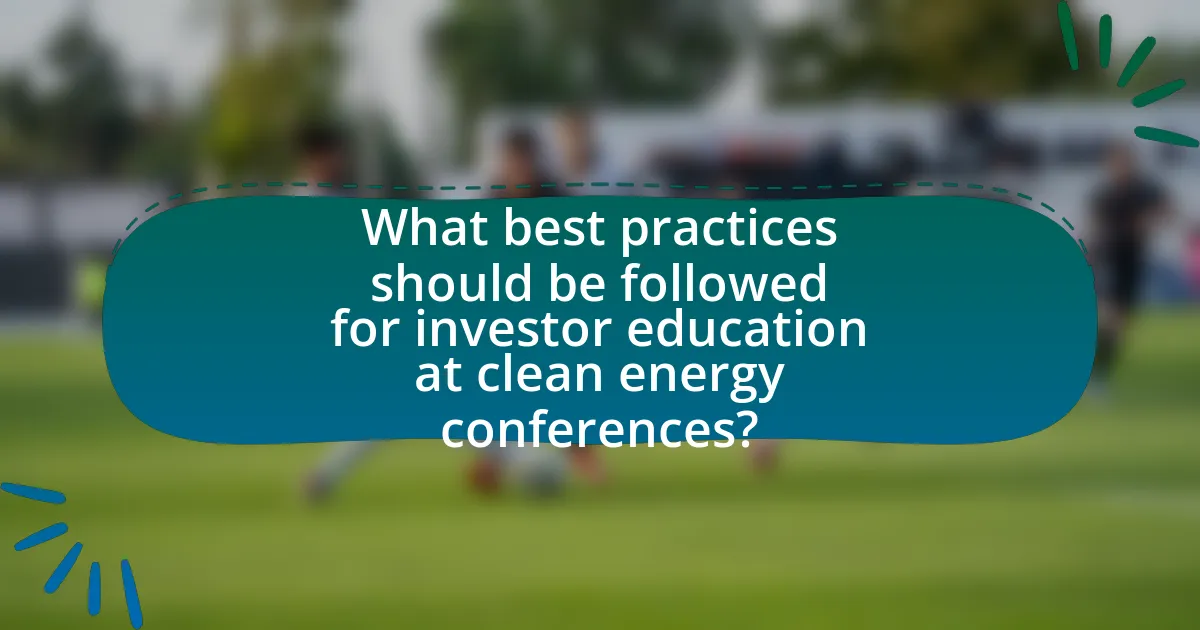
What best practices should be followed for investor education at clean energy conferences?
Best practices for investor education at clean energy conferences include providing clear, data-driven presentations, engaging expert speakers, and facilitating interactive discussions. Clear presentations should focus on the latest trends, technologies, and financial models in clean energy, supported by relevant statistics, such as the International Energy Agency’s report indicating a 50% increase in renewable energy investments from 2019 to 2021. Engaging expert speakers with proven industry experience enhances credibility and provides attendees with valuable insights. Interactive discussions, such as Q&A sessions and workshops, encourage participation and allow investors to address specific concerns, fostering a deeper understanding of clean energy financing.
What strategies can enhance the effectiveness of educational sessions?
To enhance the effectiveness of educational sessions, incorporating interactive elements such as discussions, case studies, and hands-on activities is essential. Research indicates that active participation increases retention and understanding; for instance, a study published in the Journal of Educational Psychology found that students engaged in interactive learning scored significantly higher on assessments compared to those in traditional lecture formats. Additionally, tailoring content to the audience’s specific needs and providing real-world applications can further improve engagement and comprehension, as evidenced by the success of workshops that focus on practical scenarios in clean energy financing.
How can feedback from participants be utilized to improve future conferences?
Feedback from participants can be utilized to improve future conferences by systematically analyzing their responses to identify strengths and weaknesses in the event’s structure, content, and delivery. For instance, if participants express dissatisfaction with specific sessions or topics, organizers can adjust the agenda to better align with attendees’ interests and needs. Additionally, feedback can highlight logistical issues, such as venue accessibility or scheduling conflicts, allowing for more effective planning in future events. Research indicates that 70% of conference attendees value post-event surveys, which provide actionable insights for enhancing future experiences. By implementing changes based on this feedback, organizers can foster greater engagement and satisfaction, ultimately leading to more successful conferences focused on investor education in clean energy financing.
What are the key elements of a successful educational program for investors?
A successful educational program for investors includes comprehensive content, expert instructors, interactive learning methods, and ongoing support. Comprehensive content ensures that investors receive in-depth knowledge about clean energy financing, covering topics such as market trends, risk assessment, and investment strategies. Expert instructors, often with real-world experience, enhance credibility and provide valuable insights. Interactive learning methods, such as workshops and case studies, engage participants and facilitate practical application of concepts. Ongoing support, including access to resources and networking opportunities, helps investors stay informed and connected within the clean energy sector. These elements collectively contribute to a robust educational framework that empowers investors to make informed decisions.
What resources are available for ongoing investor education in clean energy?
Ongoing investor education in clean energy is supported by various resources, including online platforms, webinars, industry reports, and educational institutions. Websites like the International Renewable Energy Agency (IRENA) and the U.S. Department of Energy provide comprehensive resources, including market analysis and policy updates. Additionally, organizations such as the Clean Energy States Alliance offer webinars and workshops focused on investment strategies in clean energy. Industry reports from firms like Bloomberg New Energy Finance and Wood Mackenzie provide data-driven insights that are crucial for informed investment decisions. These resources collectively enhance investor knowledge and understanding of the evolving clean energy landscape.
What online platforms and tools can investors use for continuous learning?
Investors can use platforms such as Coursera, Udemy, and Khan Academy for continuous learning. These platforms offer a variety of courses focused on finance, investment strategies, and clean energy topics. For instance, Coursera partners with universities and organizations to provide courses that cover the latest trends in clean energy financing, enhancing investors’ knowledge and skills. Additionally, tools like Investopedia and Seeking Alpha provide articles, tutorials, and market analysis, which are essential for staying updated on investment opportunities and industry developments. These resources collectively support investors in making informed decisions in the evolving clean energy sector.
How can investors stay updated on the latest trends and developments in clean energy financing?
Investors can stay updated on the latest trends and developments in clean energy financing by regularly following industry reports, subscribing to relevant newsletters, and attending conferences focused on clean energy. Industry reports from organizations like the International Energy Agency provide data-driven insights, while newsletters from clean energy associations deliver timely updates. Conferences, such as the Clean Energy Finance Forum, offer networking opportunities and expert panels that discuss emerging trends and innovations in financing clean energy projects. These resources collectively ensure that investors remain informed about market dynamics and investment opportunities in the clean energy sector.
What practical tips can investors apply to maximize their education in clean energy financing?
Investors can maximize their education in clean energy financing by actively participating in industry conferences, engaging with experts, and utilizing online resources. Attending conferences allows investors to network with industry leaders, gain insights into emerging trends, and understand regulatory changes affecting clean energy investments. Engaging with experts through panel discussions and Q&A sessions provides direct access to valuable knowledge and practical experiences. Additionally, utilizing online resources such as webinars, research papers, and industry reports can supplement learning and keep investors informed about the latest developments in clean energy financing. These strategies collectively enhance an investor’s understanding and ability to make informed decisions in the clean energy sector.
